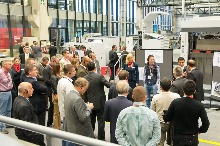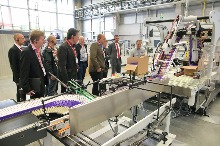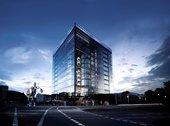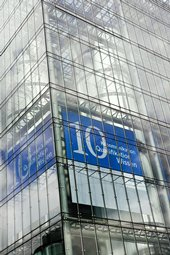Displaying items by tag: Heidelberg Print Media Academy
Heidelberg Packaging Days Attract Some 120 Participants
 The Packaging Days of Heidelberger Druckmaschinen AG (Heidelberg) on September 25 and 26 at the Print Media Center in Wiesloch-Walldorf enabled some 120 customers and industry experts from across Europe, USA and Brazil to obtain information about the company's packaging solutions. The focus was on the interaction of technology, services, and consumables for successful business models in packaging printing and folding carton gluing. Key topics included HEI Productivity through intelligent material logistics and HEI Quality, as represented by the automated color measurement and control systems Prinect Inpress Control, Prinect Image Control and the inline inspection systems Prinect Inspection Control and Diana Inspection Control. An entire day of the event was dedicated to showcasing the benefits of the optimized production processes that can be achieved using the Prinect Packaging Workflow.
The Packaging Days of Heidelberger Druckmaschinen AG (Heidelberg) on September 25 and 26 at the Print Media Center in Wiesloch-Walldorf enabled some 120 customers and industry experts from across Europe, USA and Brazil to obtain information about the company's packaging solutions. The focus was on the interaction of technology, services, and consumables for successful business models in packaging printing and folding carton gluing. Key topics included HEI Productivity through intelligent material logistics and HEI Quality, as represented by the automated color measurement and control systems Prinect Inpress Control, Prinect Image Control and the inline inspection systems Prinect Inspection Control and Diana Inspection Control. An entire day of the event was dedicated to showcasing the benefits of the optimized production processes that can be achieved using the Prinect Packaging Workflow.
Practical customer demonstration based on complete valued-added chains
Complete HEI End value-added chains for folding carton production - from prepress and press to postpress - showed participants the benefits of integrated, sustainable production. Each of the production lines was built around a press with a complete logistics system, such as the Speedmaster XL 106 for the 70 x 100 centimeter (27.56 x 39.37 inch) format that was unveiled at drupa and the large-format Speedmaster XL 145. Postpress equipment on show included the Dymatrix 106 Pro CSB die cutter, and the Diana X 80 and Diana X 115 folding carton gluing machines. On the Diana X 80, Heidelberg also demonstrated the new Diana Inspection Control inline inspection system, which identifies defective repeats prior to gluing and ejects them from the production process at full machine speed. In addition, the company showcased the benefits of the new Braille module, which has been developed specifically for the manufacture of pharmaceutical packaging and enables fast and reliable inline Braille embossing of packaging.
Besides the actual technology, highlighting the importance of an efficient service portfolio and the smooth interaction of equipment and consumables for reliable and stable production formed an integral part of all the demonstrations.
 Entire day dedicated to demonstrating the Prinect Packaging Workflow
Entire day dedicated to demonstrating the Prinect Packaging Workflow
This was the first time in the history of the Packaging Days that Heidelberg had devoted an entire day to the topic of HEI Integration, demonstrating the many different applications of the Prinect Packaging Workflow that was extended to coincide with drupa. Job management and production were fully integrated and all the individual steps were demonstrated - from structural design to delivery of the finished cartons. The complete integration of all print shop steps is even more important in the highly industrialized production of folding cartons than in purely commercial printing, because reducing makeready times and paper waste at the press and postpress stages significantly boosts the profitability of production for both initial and repeat orders. The Prinect Packaging Workflow offers a comprehensive range of functions for this kind of cost-efficient industrialized production. The workflow presentation focused on saving material, reliability in production, and optimum repeatability. Participants were also treated to a detailed presentation of Prinect Package Designer, which integrates structural packaging design in Prinect to create the graphic design directly on the contour data with Adobe Illustrator while also performing a 3D check.
Accompanying workshops and opportunities to chat with experts
Participants could use the accompanying workshops that took place on both days of the event to obtain detailed information about specific Heidelberg products and services in which they had a particular interest and determine how important they were for their business model. Heidelberg experts were available for in-depth discussions on all topics.
"The great interest in our solutions for packaging printing underlines the importance of this growth segment for both our customers and our company. Although it's not that long since drupa, many participants took the opportunity offered by our customer demonstration center to obtain detailed information about how to structure their business more profitably in terms of both technology and business management," explains Stephan Plenz, member of the Management Board responsible for Heidelberg Equipment.
Heidelberg Optimizes Financing Structure and Pays off KfW Loan
At the end of 2010, Heidelberger Druckmaschinen AG (Heidelberg) repaid in full the loan from the Special Program of the KfW (Reconstruction Loan Corporation) for large companies ahead of schedule. The KfW loan was reduced by just under EUR 190 million immediately after the capital increase last year, and now the remaining sum of around EUR 100 million has been repaid following some reallocation within the financing structure.
"We would like to thank the KfW for supporting us during the financial and economic crisis and helping us to bridge this difficult period. It was, however, always understood that we would revert to capital market financing as soon as possible. As announced, we therefore used all the net proceeds from the capital increase in September 2010 to reduce our financial liabilities. We then repaid the outstanding sum of approximately EUR 102 million due under the KfW loan ahead of schedule on December 30, 2010. This has simplified our financing structure and will also facilitate our future refinancing," said Heidelberg CFO Dirk Kaliebe.
The proceeds from the capital increase and the positive free cash flow in the first half of the current financial year enabled Heidelberg to significantly lower its financial liabilities from some EUR 816 million at the end of March 2010 to around EUR 377 million by the end of September 2010.
The capital increase has given Heidelberg a more stable capital structure overall, with a much lower net debt of EUR 243 million and a solid equity basis of around EUR 830 million as at September 30, 2010. This has also resulted in a change to the Group's financing requirements. Financing has fallen from the previous level of EUR 1.4 billion to just under EUR 900 million. It is now made up of the credit line supported by guarantee pledges from the State and the syndicated credit line from a consortium of banks. These two credit lines have each been reduced to around EUR 445 million.
In summer 2009, Heidelberg concluded a financing package for the period up to the middle of 2012. It comprised a loan for an original sum of EUR 300 million from the KfW, a loan originally totaling EUR 550 million, supported by guarantee pledges from the Federal Government and the States of Baden-Württemberg and Brandenburg, and an existing syndicated credit line from a consortium of banks, also for an original amount of EUR 550 million.
Next Winter University of the Print Media Academy Will Take Place in Thailand
The Print Media Academy in Heidelberg and in Kuala Lumpur together with Heidelberg Thailand will jointly be hosting the next Winter University 2011 in Bangkok, Thailand, from March 20 to March 24, 2011. The four-day intensive seminar at the Shangri-La Hotel is geared to participants from all over the world, offering them the opportunity to broaden their knowledge of the sector and share experience and strategies for success.
"The pressure to compete and changing market dynamics are continuing to increase. Managers in the print media industry therefore always need to be up to date on current trends in the industry and comprehensive, sustainable methods of strategic management," says Martina Brand, Head of International Business Training at the Print Media Academy in Heidelberg. That's why the seminar will be focusing on the different aspects of business management in particular. Further presentations and discussions and an onsite customer visit will spark new ideas within the areas of finance, controlling, leadership as well as marketing and management. Participants will also have the chance to discuss their own experience with experts and colleagues and get valuable feedback.
The course will be led by Stan Solomidis and Martina Brand. Solomidis is the owner and director of Synthesis Australia Pty Ltd. Solomidis sits on the board of some very competitive and marketing oriented printing businesses and this experience coupled with his corporate experience makes him well equipped to assist printing managers who are looking to improve their firm's performance.
The Winter University has established itself within the print media industry as an important international forum. Executives from all over the world use the opportunity to share country-specific experience and network in an informal atmosphere. Previous venues have included Shanghai, Hongkong, Moscow, Sao Paulo, Capetown and Dubai.
The location for the event is the Print Shangri La Hotel in Bangkok. The seminar fee is EUR 1.650 plus VAT (2.182 US$), which includes lunch and drinks on each day as well as a team event and all seminar handouts. As the number of participants is limited, early registration is recommended. The seminar language is English.
Up-to-date seminar information and profiles of the speakers are available on the internet at www.print-media-academy.com
Cutting the CO2 Footprint – Heidelberg Highlights Opportunities for Manufacturers and Customers
Eco-friendly printing is one of the big issues in the print media industry, with a growing awareness of the need to protect the environment. The increasing scarcity of resources and the impact on air, water, and soil are making this urgently necessary, with the focus first and foremost on cutting CO2 emissions. Heidelberger Druckmaschinen AG (Heidelberg) provides support for its customers in all areas relating to environmental protection, thus helping enhance their competitiveness.
Sustainability Report 2009/2010
Dedicated to the CO2 footprint issue, the Heidelberg Sustainability Report for financial year 2009/2010, which has just been published, explains the ins and outs of the topic, its importance in the print media industry, how the CO2 footprint can be influenced, and what Heidelberg is doing to reduce it in press production and the print process. Heidelberg is committed to taking a holistic approach to eco-friendly printing, giving consideration not only to cutting the CO2 footprint but also to reducing and avoiding energy consumption, emissions, and process waste.
Through the example of manufacturing a press, the Sustainability Report 2009/2010 explains what the CO2 footprint is made up of and how it can be calculated precisely. For instance, the materials and energy used in manufacturing a Speedmaster XL 105 five-color press with coating unit add up to 218 metric tons of CO2. Examining the ratio of materials to CO2 emissions provides interesting findings. Heidelberg is currently the only press supplier that uses such a precise method and can ensure carbon offsetting for the presses it manufactures.
The Sustainability Report itself serves as an example for calculating a publication's carbon footprint. It also identifies the aspects that have the strongest impact on CO2 emissions, such as paper and the energy used - factors that therefore offer the greatest potential for savings.
Two customer profiles from Germany and the Netherlands offer a powerful demonstration of how varied the approaches to environmental protection and implementing it in practice can be and how important personal commitment is.
The report is rounded off by news on the environment, business, and social responsibility, and site and project information.
"We have a clear commitment to taking a pioneering role in environmental protection in the printing industry and providing our customers with support in putting this into practice. We see our comprehensive measures in this area as an opportunity to combine environmental and economic benefits. Printing ecologically ultimately also means thinking economically," says Stephan Plenz, Member of the Management Board at Heidelberg.
Environmental protection along the entire value added chain
Environmental protection at Heidelberg has been an integral part of its company objectives since 1992. The company works consistently and systematically to achieve this aim along the entire value added chain, from product development and production to their use by customers. Heidelberg focuses on three aspects - wherever possible, consumption of resources, emissions, and waste should be reduced or, ideally, avoided completely. In producing the Sustainability Report 2009/2010 it was also made use of the opportunities for conserving resources and minimizing CO2, while the CO2 emissions that could not be avoided were offset. The report therefore leaves no CO2 footprint overall.
Heidelberg Print Media Academy Established as World Number One
 Plenty of congratulations received the Heidelberg Print Media Academy (PMA) not only because of its tenth anniversary, but also for a top-class congress on learning from and with each other conducted on May 6, 2010 on the occasion of the anniversary. Some 200 guests took up the invitation issued by Heidelberger Druckmaschinen AG (Heidelberg) and gathered at the Print Media Academy.
Plenty of congratulations received the Heidelberg Print Media Academy (PMA) not only because of its tenth anniversary, but also for a top-class congress on learning from and with each other conducted on May 6, 2010 on the occasion of the anniversary. Some 200 guests took up the invitation issued by Heidelberger Druckmaschinen AG (Heidelberg) and gathered at the Print Media Academy.
Following a welcoming address and introduction by Heidelberg Management Board members Bernhard Schreier and Marcel Kiessling, Professor Norbert Walter, formerly Chief Economist at Deutsche Bank, set out the prospects for the future and for economic development.
Dr. Eike Wenzel from the Zukunftsinstitut (Institute for the Future) then gave a keynote speech highlighting the impact of new media and communication channels on social structures and customs.
Learning, training, and knowledge transfer are considered extremely important at Heidelberg -
a fact underlined by CEO Bernhard Schreier. "The opening of the Print Media Academy in Heidelberg ten years ago and the associated expansion of our international training activities laid the foundation for offering comprehensive practical training to our customers - and to our customers' customers. Without sound, ongoing training activities, it would be impossible to master the ever-changing day-to-day challenges we are now facing. We see learning and teaching as a life task," he said.
Representing the city of Heidelberg, mayor Dr. Joachim Gerner offered his congratulations and stressed how important the PMA was to the city and the region. "Heidelberg's economy is not based on smoking chimneys, but on state-of-the-art technology and services. The combination of universities, research laboratories, and other educational establishments creates a unique high-density knowledge network - a key requirement for innovation and development. In the ten years since it was founded, the Print Media Academy has become an important hub in this network," he stated.
Heidelberg customer Jörn Kalbhenn, proprietor and director of B&K-Offsetdruck in Ottersweier, summed up: "My experiences with the PMA - both as a member of the Advisory Board and a former student - have been extremely positive, and I would like to say thank you for all the productive and informative years. It never ceases to amaze me how this state-of-the-art institution combines training with unusually high levels of synergy through the facilitation of international contacts. The wide range of opportunities offered by the PMA is an effective way of enabling companies and their personnel to make progress. The Academy also provides a valuable platform for discussion within the framework of interesting events and lectures. I hope the excellent program will continue and I look forward to some new ideas and opportunities," said Kalbhenn.
Center for training at all levels
From equipment and specialist training to management seminars, the Print Media Academy (PMA) provides a comprehensive and practical range of training at all levels to prepare employees and companies in the print media industry for a successful future. Specialists from Heidelberg team up with external experts to train participants on state-of-the-art equipment and deliver lectures on topical issues in the sector. The latest project is a collaboration with the ifm (Institute for Small Business Research) at the University of Mannheim - a seminar with relevance beyond the borders of the graphic arts industry that, for the first time, is open to anyone with an interest in smoothing the way for corporate succession.
companies in the print media industry for a successful future. Specialists from Heidelberg team up with external experts to train participants on state-of-the-art equipment and deliver lectures on topical issues in the sector. The latest project is a collaboration with the ifm (Institute for Small Business Research) at the University of Mannheim - a seminar with relevance beyond the borders of the graphic arts industry that, for the first time, is open to anyone with an interest in smoothing the way for corporate succession.
Every year, some 7,000 to 9,000 people take part in the PMA's training courses and seminars.
Global network
The Print Media Academy in Heidelberg is the hub of a global network extending across 18 locations in 15 countries. It offers training courses and seminars for employees and decision-makers in the print media industry. The program is globally coordinated yet also caters to specific local needs. Ongoing communication between sites ensures the up-to-dateness and internationality of information and content.
Venue
The Print Media Academy in Heidelberg has also become firmly established as a regional and national conference and event center. Companies both large and small from the Rhine-Neckar region regularly hold seminars and forums at the PMA. They particularly appreciate the conference rooms' cutting-edge technical equipment and the excellent links with the train station and local public transport network.
Even organizing large events such as product launches in the automotive industry is no problem for the PMA team. The swing door was recently dismantled to give Porsche & Co access to the generously proportioned foyer.
The PMA welcomes some 50,000 visitors every year.
"Passion for Print" exhibition
The permanent exhibition "Passion for Print" in the basement of the PMA provides an interactive multimedia presentation on the medium of print and print production. A tour gives visitors an insight into how a print product is produced and the role Heidelberg plays in this process.
The building
Since it opened on April 14, 2000, the PMA has become one of Heidelberg's landmarks. It proudly appears alongside the castle and the Old Bridge in brochures of all kinds. The materials and architecture create a sense of transparency and a feeling of lightness and openness that defies the building's size (it has 37-meter sides and is 50 meters high). This openness extends to the public - the PMA is open to all, welcoming guests, passers-by, and anyone curious enough to want to take a look inside. A lounge on the ground floor is the perfect place to sit and enjoy culinary delights and cocktails, while diners at Manfred Schwarz's restaurant on the twelfth floor can expect top-quality fare.
The front of the Print Media Academy is dominated by the "S-Printing Horse", a metal sculpture 13 meters high by Jürgen Goertz.
Picture 1: The Print Media Academy in Heidelberg.
Picture 2: Print Media Academy banner on the occasion of its 10-year anniversary in 2010.
For further information:
Heidelberger Druckmaschinen AG
Claudia Cischek
Telephone: +49 (0)6221 92 57 05
Telefax: +49 (0)6221 92 50 69
E-mail: This email address is being protected from spambots. You need JavaScript enabled to view it.

